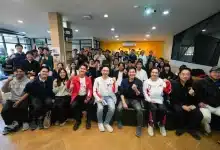Arrest warrant issued to former Pheu Thai chief for failure to attend corruption hearing”

The Supreme Court’s Criminal Division for Political Office-Holders issued an arrest warrant for former Pheu Thai Party leader Charupong Ruangsuwan for failing to attend the first hearing in his case where he is charged with accepting excessive gifts while serving as Interior Minister from 2012-2013.
Charupong was scheduled to appear on December 13, 2022, but did not show up and was represented by his lawyer. He fled to the United States after the 2014 military coup that toppled the Pheu Thai government and has not returned to Thailand since.
The court case against Charupong started after he was indicted by prosecutors following a February 2022 finding by the National Anti-Corruption Commission (NACC) that he violated Section 103 of the Anti-Corruption Act of 2018.
Charupong was accused of demanding a company pay for airline tickets worth almost 60,000 baht, reported Bangkok Post.
According to Section 103, public officials are prohibited from accepting gifts exceeding 3,000 baht and can face fines of 30,000 baht, jail time of three years, or both as punishment.
Charupong and his group took two trips in 2012, from Bangkok to Beijing on China Airlines and from Bangkok to Kuala Lumpur on Malaysia Airlines, with business class tickets costing nearly 60,000 baht.
The National Anti-Corruption Commission (NACC) stated that Charupong demanded that Eastern Water Resources Development and Development Plc (Eastwater) pay for these tickets even though he had no official connection or authority over the company, which is a private firm.
After escaping to the US, Charupong established the Organisation of Free Thais for Human Rights and Democracy (OFHD) to protest against the rule of coup leader General Prayut Chan-o-cha.
On June 24, 2015, Charupong, acting as Secretary-General of OFHD, in a video uploaded on YouTube warned Thais of the risk of Thailand turning into a failed state and detailed three goals of OFHD: 1. abolition of the Privy Council, 2. depoliticization/democratization/normalization of the Thai Army, and 3. depoliticization of the Thai judiciary.
Latest Thailand News
Follow The Thaiger on Google News:


























